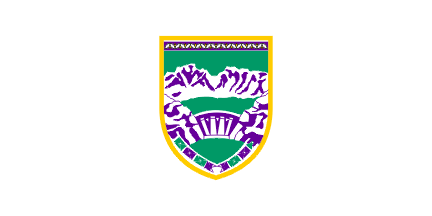
by Zeljko Heimer, 20 June 2004

Last modified: 2004-07-03 by dov gutterman
Keywords: bosnia and herzegovina | jablanica | herzegovina-nertava |
Links: FOTW homepage |
search |
disclaimer and copyright |
write us |
mirrors

by Zeljko Heimer, 20 June 2004
See also:
Jablanica is a community in the Herzegovina-Neretva Canton, at
the site of an important hydroelectric powerplant dam. The coat
of arms and the flag are shown on the community web site at <www.jablanica.ba>.
The coat of arms of Jablanica pictures the damn and the
acumulation lake on the Neretva river with the folklore ornament
at chief and in base and all bordered golden yellow.
The flag is white with the coat of arms in the middle. The flag
shown on thesite seems to be in ratio 2:3, but I do not trust
much these representation and am fiarly convinced that the 1:2
ratio flag would be used.
Information located by Pascal Gross.
Zeljko Heimer, 18 May 2004
I received answers from the communiy officials
(www.jablanica.ba) The Coat of Arms was adopted on 25 February
1999 with the decision: Odluka o grbu opc'ine Jablanica,
25.02.1999, Opc'ina Jablanica, Opc'insko vijec'e, br.
01/3-023-16/99, Službeni glasnik opc'ine Jablanica.
The coat of arms is prescribed usung unusual colours of purple
and blueish-green (and white and golden-yellow, of course). The
coat of arms of Jablanica pictures the dam and the acumulation
lake on the Neretva river with the folklore ornament at chief and
in base the broken bridge and all bordered golden yellow.
The dam was bult in 1955 and was one of the most important
post-World War II engeenering projects. (The stamp collectors may
remember the frequent stamps of the period showing it). The
bridge pictured was thorn down in 1943 by the Tito's partisans
during the, so called, Fourth offensive performed by the Axis to
finish off with the "Tito's state". In the retreat Tito
ordered thoring down all the bridges over Neretva, and the forces
were pulled out over an improvised bridge at Jablanica next to a
thorn down railroad bridge. The story is one of the most revered
epics of the WWII in Yugoslavia.
Zeljko Heimer, 20 June 2004
07-ja.gif)
by Zeljko Heimer, 20 June 2004